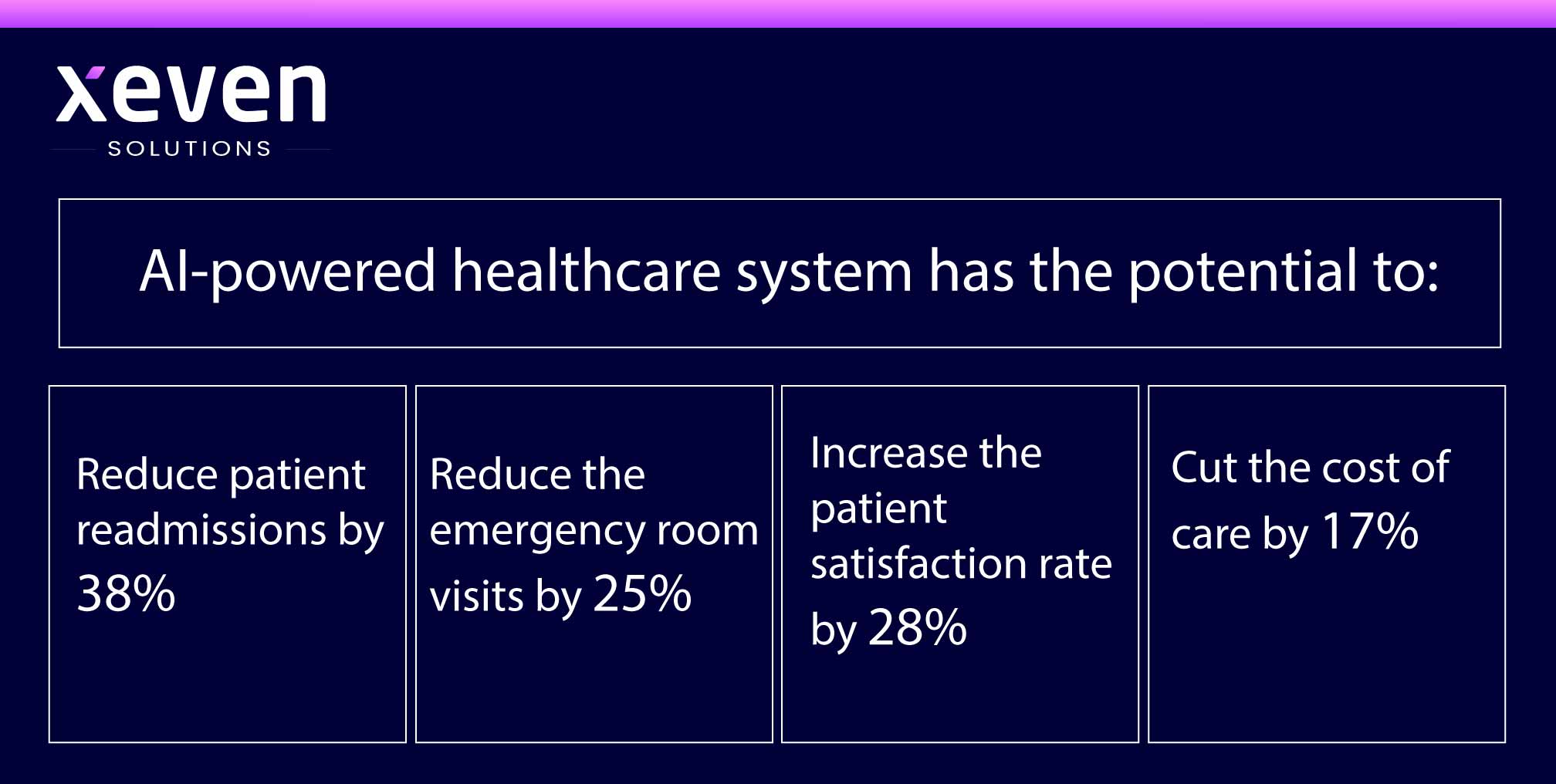

December 28, 2023
Healthcare stands on the precipice of a paradigm shift. The beautiful fusion of ML and AI drives it. These transformative technologies are destined to reshape every facet of this crucial sector. Starting from the early whispers of diagnosis to the thunderous pronouncements of treatment. AI healthcare promises personalized care and roaring predictions of healthier futures. As we approach 2024, this article shows the anticipation for the top 10 amazing AI trends in Healthcare.
AI is transforming Healthcare in myriad ways, from boosting diagnosis accuracy to personalizing treatment plans. Radiologists now have AI partners finding cancers 4% better than human teams, while genomic AI allows for custom-made therapies with fewer side effects. Meanwhile, AI-powered chatbots streamline triaging, scheduling, and patient guidance, expanding access to care.
Drug discovery gets a turbo boost as AI sifts through massive databases and predicts promising drug candidates, and chronic care leaps forward with AI-powered remote monitoring via wearables and sensors, reducing costs and keeping patients comfortable at home. This is just the beginning of AI’s revolution in Healthcare, promising a future of enhanced care, greater access, and improved outcomes for all.
According to Statista, the global healthcare AI market held a value of approximately 11 billion USD in 2021. It is projected to soar to nearly 188 billion USD by 2030. This growth represents a remarkable annual growth rate of 37% from 2022 to 2030.

Artificial intelligence shows promise to enhance every aspect of Healthcare. AI analyzes vast amounts of patient data to help providers deliver higher quality, more affordable care. AI also assists researchers in developing new treatments faster. Growing AI adoption in healthcare aims to make Healthcare more personalized and proactive.
Generative AI models help generate medical images, text, and other data. Radiologists use generative AI to create synthetic X-rays and MRIs for training. This helps address the lack of certain types of images. Generative AI also augments clinical documentation by automatically generating notes and reports from patient data. This saves providers time while maintaining high quality.
Machine learning accelerates drug discovery by analyzing molecular structures to predict interactions and side effects. AI evaluates billions of potential drug compounds to narrow options for clinical trials. This helps pharmaceutical companies develop safer, more effective medications in less time. Researchers use AI to gain novel insights that may lead to new drug targets as well.
AI proves effective at predicting patient health outcomes. Models identify at-risk patients by analyzing electronic health records. This enables proactive care management and intervention. Predictive AI also detects potential complications or adverse drug events. Providers use these predictions to guide care decisions and optimize treatment plans for each patient.
Machine learning enhances medical imaging for improved diagnosis and treatment. Artificial Intelligence detects anomalies in scans like X-rays and MRIs with superhuman accuracy. Models help radiologists catch subtle signs missed by the human eye. It also tracks disease progression and monitors treatment responses over time. AI aims to make medical imaging faster, less costly, and more accessible worldwide.
Conversational AI assistants interact with patients to deliver virtual care. Intelligent chatbots and voice assistants answer health questions, provide post-care instructions, and schedule appointments. AI helps address provider shortages by handling basic administrative tasks. Assistants also remind patients of medications or follow-up appointments to support treatment adherence.
AI enables precision medicine by identifying genomic, lifestyle, and environmental factors influencing health. Models analyze these unique patient profiles to develop highly customized treatment plans. AI-powering precision medicine aims to provide the right care to the right patient at the right time. This approach gets the best outcomes from limited healthcare resources.
Machine learning monitors patients remotely using connected devices. AI analyzes data from wearables, sensors, and medical equipment to track vital signs, activity levels, and more. Remote monitoring enables early detection of health changes to prevent or quickly treat issues. AI also identifies high-risk patients needing additional support or telehealth visits with providers.
As healthcare data and systems move online, AI protects this sensitive information and infrastructure. Machine learning models detect and block cyber threats in real time. AI also monitors networks to identify suspicious activity or data breaches. This helps secure electronic health records and medical devices from hackers. AI aims to make healthcare technology safer and help restore trust in digital health.
Regulators establish guidelines to ensure AI safety, transparency, and fairness. Standards address algorithmic bias, data privacy, and security. Regulations evaluate AI performance to verify model claims. They also require human oversight of AI to protect patients. As AI adoption grows, clear rules aim to build confidence in technology assisting healthcare decisions that impact lives.

The future of healthcare gleams with the promise of a pleasant duet between humans and machines. You can also look at how AI is transforming the future of Healthcare. This article will show you how AI algorithms work rather than replace the invaluable expertise of healthcare professionals. As these healthcare AI trends converge, we can envision a healthcare landscape where:
The future of AI in healthcare is not merely a distant mirage but a tangible prospect we stand poised to reach in 2024 and beyond. By embracing AI trends in healthcare responsibly and ethically, we can orchestrate a healthcare symphony where technology amplifies human ingenuity. As a result, it leads to a healthier, happier world for all.
If you’re ready to explore the use of AI in healthcare or want to discuss the business plan. We are here to help. You can check out Xeven Solutions’ AI Development services, Machine Learning Services and get an idea of what type of services we provide. We believe we can take your business’ growth to the next level. It will set your organization up for success in the digital age.